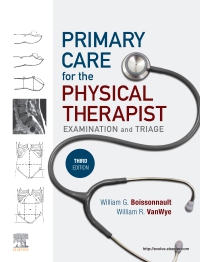
Primary Care for the Physical Therapist, 3rd Edition
Hardcover

Specifically designed to address the expanding role of physical therapists in primary care, Primary Care for the Physical Therapist, 3rd Edition covers all the information and skills your students need to be successful in the field. Updated content throughout the text helps them stay up to date on the best practices involving patient examination, medical screening, patient management, and communication. This new third edition also features a new chapter on electrodiagnostic testing, a new chapter on patients with a history of trauma, and updated information on how to screen and examine the healthy population. It’s a must-have resource for any physical therapist wanting to obtain the technical expertise and clinical decision-making abilities to meet the challenges of a changing profession.
-
- NEW! Updated content throughout the text reflects the current state of primary care and physical therapy practice.
- NEW! New chapter on electrodiagnostic testing helps familiarize physical therapists with indications for electrodiagnostic testing and implications of test results to their clinical decision-making.
- NEW! New chapter on patients with a history of trauma emphasizes the red flags that physical therapists need to recognize for timely patient referral for appropriate tests.
- NEW! Updated information on how to screen and examine the healthy population enhances understanding of the foundations of practice and the role that physical therapists can fill in primary care models.
- Tailored content reflects the specific needs of physical therapists in primary care.
- Emphasis on communication skills underscores this essential aspect of quality patient care.
- Overview of the physical examination is provided in the text to ground readers in the basis for differential diagnosis and recognizing conditions.
-
- NEW! Updated content throughout the text reflects the current state of primary care and physical therapy practice.
- NEW! New chapter on electrodiagnostic testing helps familiarize physical therapists with indications for electrodiagnostic testing and implications of test results to their clinical decision-making.
- NEW! New chapter on patients with a history of trauma emphasizes the red flags that physical therapists need to recognize for timely patient referral for appropriate tests.
- NEW! Updated information on how to screen and examine the healthy population enhances understanding of the foundations of practice and the role that physical therapists can fill in primary care models.
-
SECTION I: FOUNDATIONS 1. Primary Care Team: Now and Beyond in Physical Therapy 2. Evidence-Based Measures for Diagnosis and Outcomes 3. Health and Wellness Perspective in Primary Care 4. The Patient Interview: The Science Behind the Art of Skillful Communication
SECTION II: EXAMINATION/EVALUATION Prologue 5. Symptom Investigation: Part I-Chief Complaint by Body Region 6. Symptom Investigation: Part II-Chief Complaint by Symptom 7. Symptom Investigation: Part III-History of Trauma 8. Patient Health History Including Identifying Health Risk Factors 9. Review of Systems 10. The Patient Interview: The Physical Examination Begins 11. Cardiovascular and Pulmonary Systems Review 12. Upper Quarter Screening Examination 13. Lower Quarter Screening Examination 14. Diagnostic Imaging and Physical Therapist Practice 15. Laboratory Tests and Values 16. Electrophysiological Testing: Nerve Conduction Studies (NCS) & Electromyography (EMG)
SECTION III: LIFE CYCLE/SPECIAL POPULATIONS 17. The Adolescent Population 18. The Obstetric Patient 19. The Geriatric Population 20. “Do-Not-Want-to Miss List” of Nine Conditions

